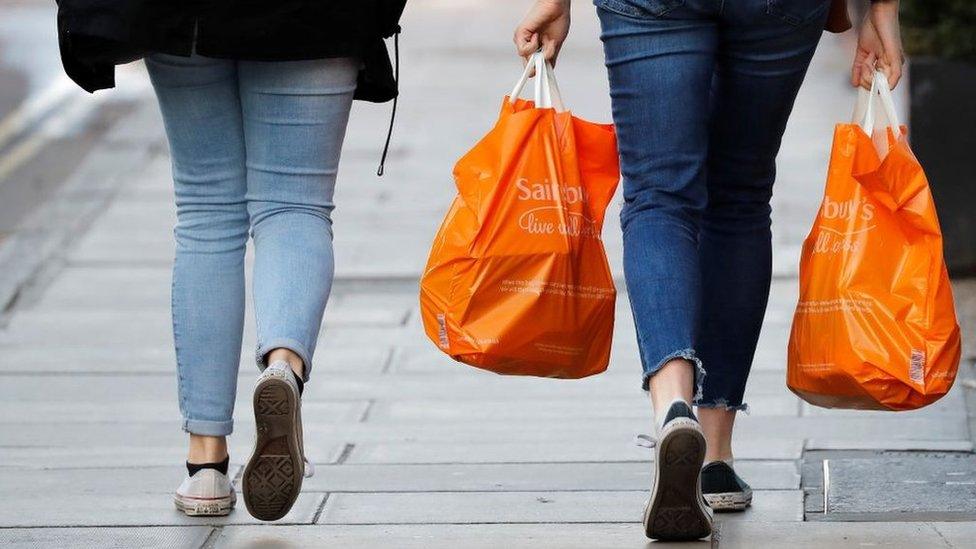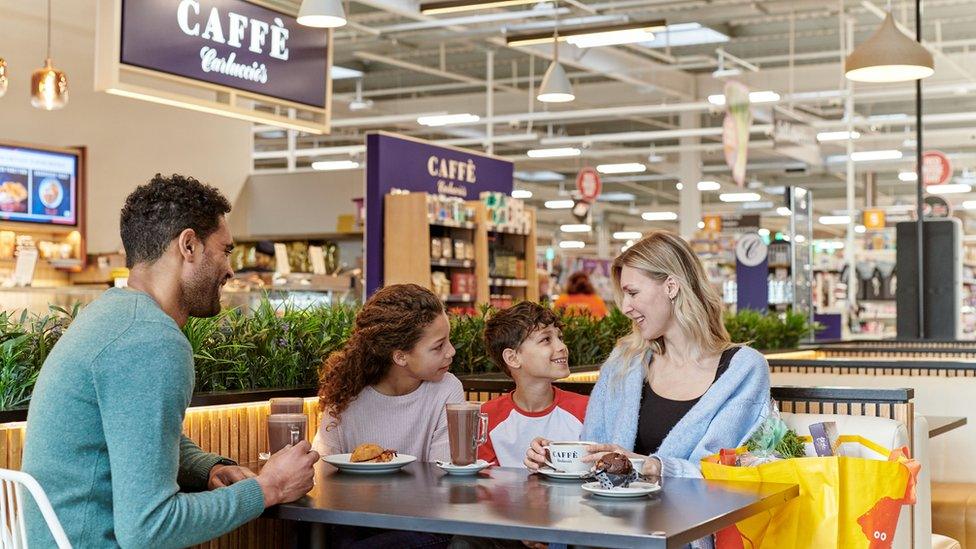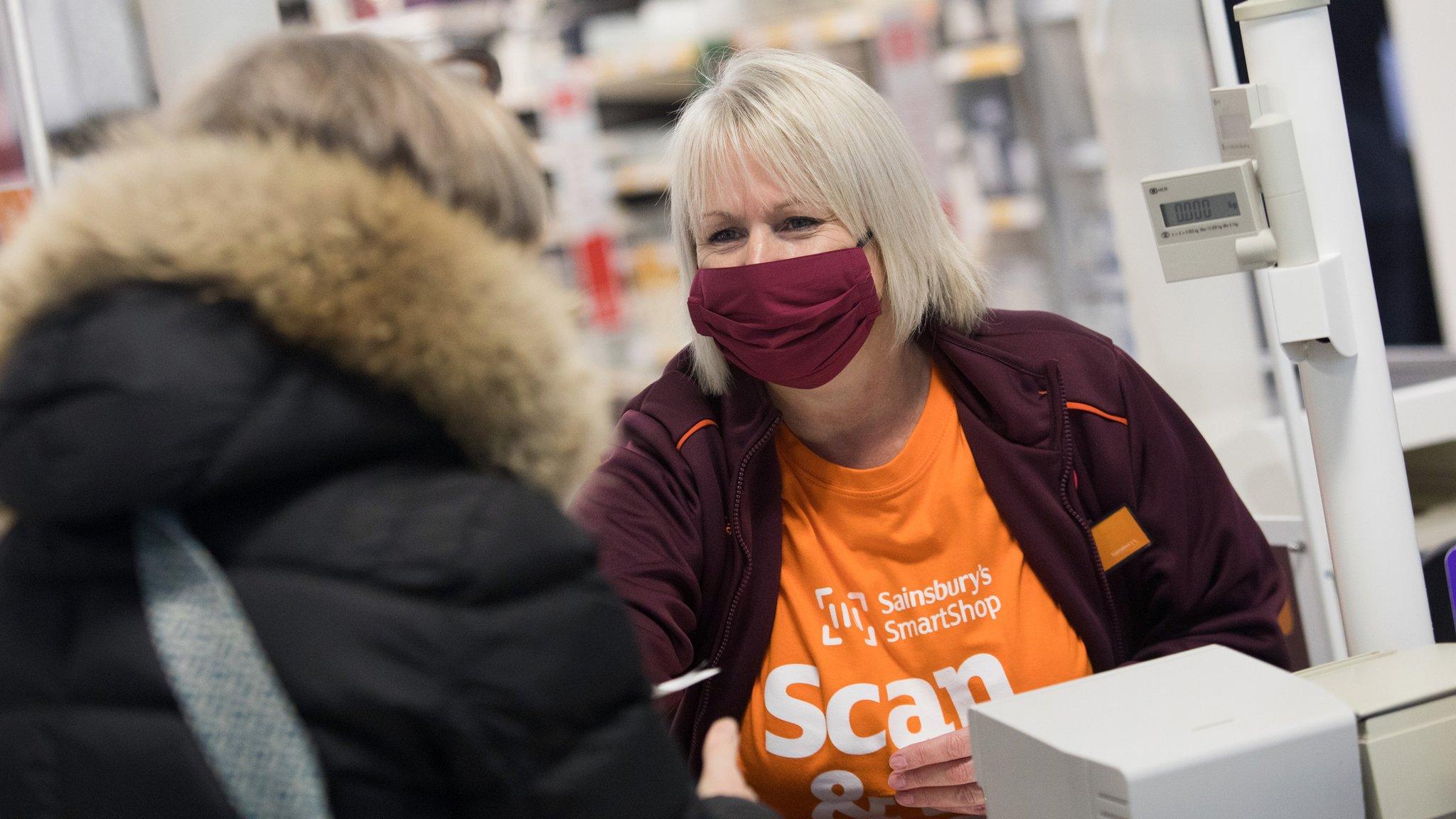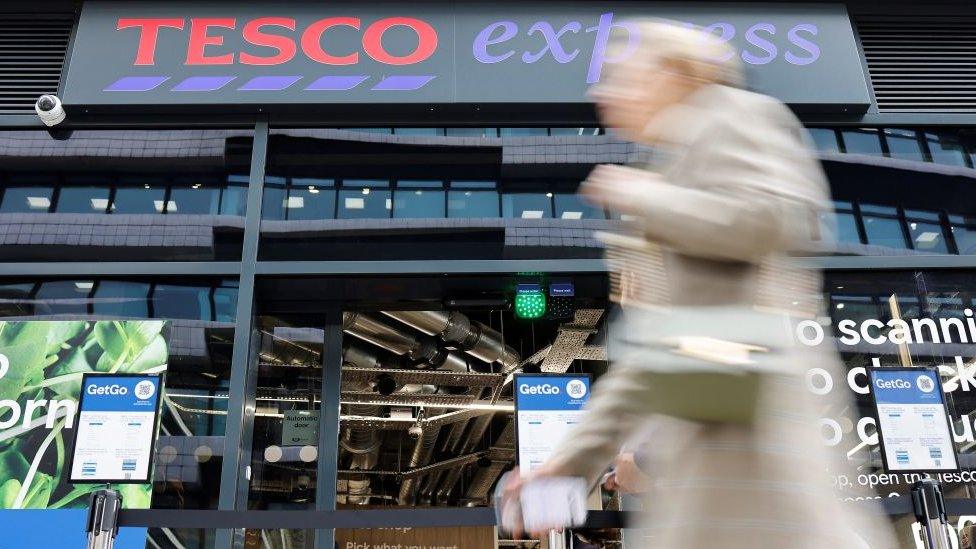Sainsbury’s to close 200 cafes putting 2,000 jobs at risk
- Published
- comments

Sainsbury's is set to close 200 of its in-store cafes next month, putting about 2,000 jobs at risk.
The supermarket has also announced plans to close less popular hot food counters in 34 stores.
Chief executive Simon Roberts said the chain was "absolutely committed" to supporting the members of staff affected.
They will be prioritised for vacant jobs and encouraged to look at alternative roles within the business.
It comes as part of new plans aimed at updating the supermarket's eat-in, takeaway and home delivery food and drink offer for customers.
The move follows a trial of a new "food hall" format called The Restaurant Hub at its Selly Oak store in Birmingham.
Off the back of the trial, Sainsbury's plans to open 30 more of the food halls in 2022, as well as 30 Starbucks coffee shops in its supermarkets over the next 12 months.
It is currently working in partnership with the Boparan Restaurant Group on the project. As part of the trial, customers were able to choose options from the likes of Gourmet Burger Kitchen, Ed's Diner and Slim Chickens.
Sainsbury's said it could increase the number of food halls in future years, if they continued to perform well with customers.
The remaining 67 cafes will remain open while Sainsbury's reviews roll-out plans.
In a statement, the supermarket said it had spoken to all of its cafe workers today about the closure plans.
It also said that it would "simplify the way it runs its bakeries" in 54 stores and hold talks with those workers and those on the hot food counters, with the aim of redeploying them in other departments in-store if possible.
The retailer has already closed its fresh fish, cheese and meat counters in stores, which saw about 3,500 jobs cut.
'Uncertain time for staff'
Mr Roberts said: "We are totally focused on improving what we can deliver for our customers and at the same time, working hard to make our business simpler.
"We are really excited about this new customer offer we will be rolling out over the next two to three years across many of our stores."

Sainsbury's said it could increase the number of food halls in future years, if they do well with customers.
He added, however, that he acknowledged this was an "uncertain" time for many members of staff.
"Of course, we understand this is very unsettling for our colleagues, but we must keep adapting our business to make sure we are offering customers the best possible food and drink at affordable prices," he said.
Susannah Streeter, senior investment analyst at Hargreaves Lansdown, said the announcement marked the latest in a raft of restructuring moves as the supermarket seeks to keep a lid on rising costs - and compete with the likes of discounters Aldi and Lidl.
"The chain is clearly hoping customers will 'taste the difference' via these tie-ups... while its own staff costs are taken out of the equation and it can concentrate spend on the business of filling trollies and virtual baskets instead," she said.

Sainsbury's is the first of the "big four" supermarkets to restructure its cafes. It's all part of a wider plan to simplify the business and save money.
Caffè Carluccio's is going to be the main offer and it will work alongside one or two other brands using the same kitchen, which will fulfil orders for home deliveries and takeaways too.
Sixty-seven Sainsbury's cafes remain, for now. They provide hot food like a cooked breakfast and are still popular with shoppers. So bringing in these new, popular, brands is an eye-catching move. Other new partners could also be brought in.
Will shoppers will miss the old cafes? The new ones won't be as cheap. But in-store cafes are hard work to run. Sainsbury's is prioritising its food offer in the aisles and trying to stay as competitive as possible on price.

But Unite the union hit out at Sainsbury's, demanding compulsory redundancies for cafe workers should be ruled out.
Unite national officer for food, drink and agriculture, Bev Clarkson, said: "Our members showed great loyalty to Sainsbury's during the pandemic. They served their communities during lockdown and ensured Sainsbury's flourished when other businesses flatlined.
"Now Sainsbury's must repay them by keeping job losses to an absolute minimum and ruling out compulsory redundancies," she said.
Richard Lim, the chief executive of Retail Economics added that the pandemic had brought about huge changes for the food industry.
"Disruptive technologies have created near frictionless access to groceries, takeaway and food on-demand, resulting in greater competition and the merging of channels," he said.
He added that takeaways could be a "lucrative opportunity" for supermarkets which have enough stores to supply large numbers of people with lots of different cuisines.
"The takeaway market has seen impressive growth in recent years as digital platforms provide greater choice, faster deliveries and more competition. So there's no surprise that the supermarkets are trying to establish a firm foothold in the market and cater for evolving consumer habits."
Related topics
- Published7 January 2022

- Published5 February 2022
